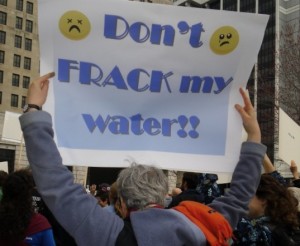16th December 2011
By Pam Kasey – statejournal.com
The U.S. Environmental Protection Agency released a draft analysis Dec. 8 of data of its investigation of groundwater quality in the gas fields of Pavillion, Wyo.
“The draft report indicates that ground water in the aquifer contains compounds likely associated with gas production practices, including hydraulic fracturing,” reads the agency’s media release.
The investigation in Pavillion, where natural gas has been produced since 1960 and Encana Oil and Gas conducted hydraulic fracturing while developing new wells between 2004 to 2007, has been seen as an important test of the gas industry’s assertions that there has never been an incident in which groundwater was contaminated by hydraulic fracturing.
EPA began investigating water quality concerns in Pavillion private drinking water wells three years ago at the request of residents.
Its draft report discusses two sets of monitoring data.
[pro_ad_display_adzone id=”110028″]
One set, from two deep water monitoring wells constructed in the aquifer by the agency, found synthetic chemicals, including glycols and alcohols, that are “consistent with” gas production and hydraulic fracturing fluids; benzene concentrations well above Safe Drinking Water Act standards; and high methane levels. The agency expressed concern about the movement of contaminants within the aquifer and the safety of drinking water wells over time.
The agency also sampled drinking water wells, where it found methane, petroleum hydrocarbons and other chemical compounds. Although the contaminants were found at concentrations “generally below health and safety standards,” affected well owners have been advised to use alternate sources of water, and Encana has funded the alternate water supplies.
The draft findings are specific to Pavillion, where the fracturing is taking place in and below the drinking water aquifer and in close proximity to drinking water wells, the agency stressed — production conditions different from those in many other areas of the country.
West Virginia Oil and Natural Gas Association Executive Director Nicholas “Corky” DeMarco found that problematic, and contacted a Wyoming colleague to ask about it.
“He said they don’t have aquifers, they have pockets where water collects,” DeMarco said. “Here in the Kanawha Valley, everybody’s well is generally in the same aquifer. His explanation to me was that there, water pools up in pockets rather than in one formation that might go on for miles and miles and miles. Wells could be in totally different pockets.”
Also, he said, the drinking water wells tested safe, so maybe the EPA’s own drilling of the test wells created the contamination.
Encana took issue with the draft study.
The study ignores historical water quality problems in Pavillion, the company said in a media release, and control samples showed that the agency’s samples may have been contaminated.
The drinking water samples did not show the man-made contaminants in the test wells, the company reiterated, and since the EPA wells were drilled deeper than drinking-water depth, into a natural gas reservoir, it’s not surprising that they should find other substances.
An Encana concern was echoed in an e-mail Chesapeake Energy Chief Operating Officer Steve Dixon, whose operations include shale drilling and fracturing in West Virginia, sent to employees: the results of the EPA study have not been subjected to peer review.
“Its alleged ‘findings’ will almost assuredly not withstand that process,” Dixon wrote. “The way this release was handled seems to any objective observer to point to the EPA being more interested in their PR strategy and in establishing a connection between hydraulic fracturing and water contamination than in finding the truth.”
The draft study is available for a 45-day public comment period (link available here after Dec. 14) and a 30-day peer-review process led by a panel of independent scientists.
The agency affirmed in its media release the Obama administration’s commitment to the role of natural gas in the nation’s clean energy future.
The agency is conducting a separate, national study on the potential impacts of hydraulic fracturing on drinking water resources, initiated at the direction of Congress.
[pro_ad_display_adzone id=”110027″]







